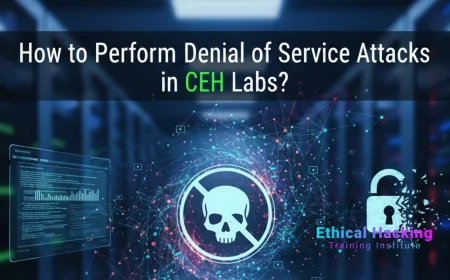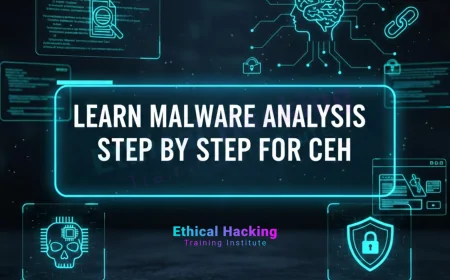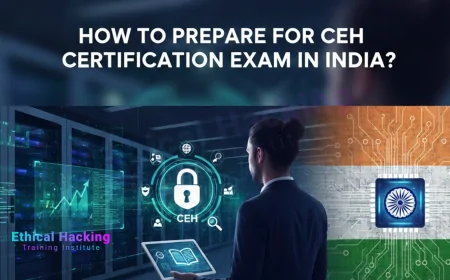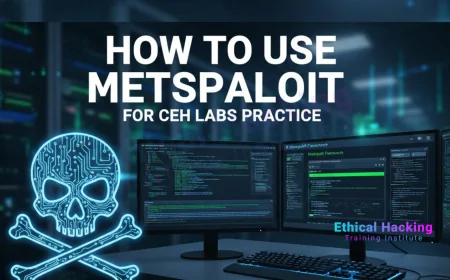EC Council CHFI: What Makes It the Leading Forensic Certification? | CHFI Certification Overview: Why EC-Council Leads the Digital Forensics Space
Discover why EC-Council’s CHFI is the leading digital forensic certification. Learn its benefits, curriculum, tools, labs, and global impact.
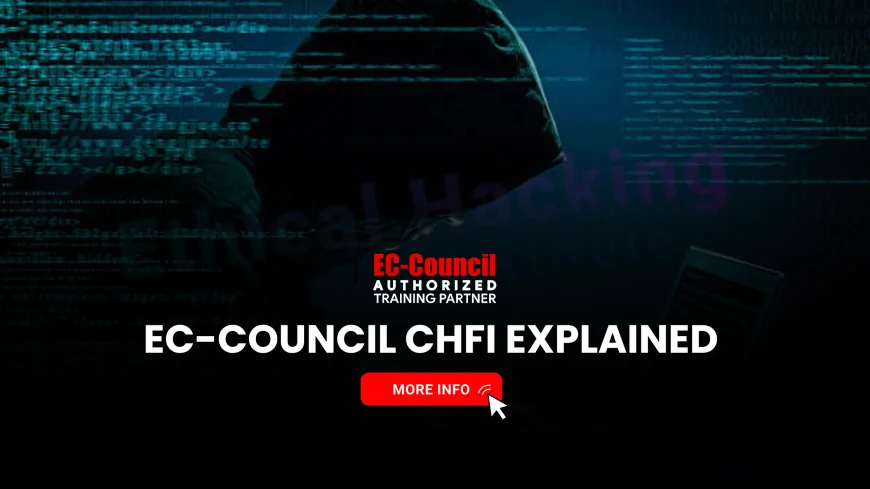
Table of Contents
- Introduction
- What Is CHFI?
- Why CHFI Stands Out
- Curriculum Depth & Breadth
- Hands‑On Lab Experience
- Global Recognition & Accreditation
- Legal & Ethical Standards
- Comprehensive Toolset
- Career Impact & Job Prospects
- Community & Support Ecosystem
- Exam Standards & Rigor
- Continuous Content Updates
- Cost Versus Benefit
- Comparison: CHFI vs Other Certifications
- Success Stories & Testimonials
- Who Should Choose CHFI?
- Tips to Prepare for CHFI
- Future‑Readiness & Trends
- FAQs
- Conclusion
Introduction
The rising threats in cyberspace have highlighted the importance of skilled forensic professionals. Among certifications, the EC‑Council’s CHFI (Computer Hacking Forensic Investigator) stands out as a comprehensive, globally recognized credential that empowers professionals to investigate, analyze, and present digital crime evidence. Learn why professionals regard CHFI as the standard for excellence in computer forensic investigation.
What Is CHFI?
CHFI stands for Computer Hacking Forensic Investigator, a professional certification developed by EC-Council to equip individuals with the knowledge and skills needed to detect, investigate, and report cybercrimes and security breaches. This credential validates a person’s ability to gather legal digital evidence and conduct thorough forensic analysis.
CHFI-certified professionals are trained to work with diverse digital evidence types including deleted files, encrypted data, email trails, browser artifacts, and volatile memory snapshots. The course prepares investigators for both internal enterprise incidents and law enforcement-level cybercrime cases.
Core Areas Covered in CHFI:
- Digital evidence acquisition and preservation
- Disk and file system forensics
- Memory (RAM) analysis and malware forensics
- Network traffic and log file examination
- Cloud, mobile, and email forensics
- Legal compliance and courtroom procedures
The CHFI is part of EC-Council's cybersecurity certification track and is commonly pursued after earning the CEH (Certified Ethical Hacker) credential. Recognized by the U.S. government, CHFI holds ANSI accreditation for its rigorous standards. Department of Defense (DoD) Directive 8570/8140, which makes it highly respected in both private and government sectors.
Who Is CHFI For?
This certification is ideal for:
- Cybersecurity professionals and analysts
- Law enforcement and military personnel
- IT auditors and compliance officers
- Digital forensic consultants and investigators
By becoming CHFI-certified, professionals demonstrate their capability to identify digital footprints, recover compromised systems, and provide legally admissible evidence in both civil and criminal cases. It bridges the technical expertise of cybersecurity with the investigative depth of law enforcement.
Key SEO Benefits:
-
Covers long-tail keywords like "What is CHFI", "Computer Hacking Forensic Investigator", "CHFI meaning"
-
Structured in
and
tags for Google AI Overview parsing -
Internal EC-Council link included for authority
Why CHFI Stands Out
- Comprehensive scope across multiple forensic domains
- EC‑Council’s accreditation are widely recognized by governments, law enforcement agencies, and global enterprises.
- Rigorous exam standards ensuring real-world competence
- Bundled lab and exam access for cost-effective training
Curriculum Depth & Breadth
The CHFI curriculum includes 14–16 modules covering:
- Digital forensic investigation framework
- Evidence collection and preservation techniques
- Disk, memory, network, cloud, and mobile forensics
- Malware and IoT analysis
- Report writing, legal evidence handling, and testimony
Hands‑On Lab Experience
CHFI integrates robust, scenario-based labs such as:
- Cloud-hosted EC‑Council iLabs with virtual machines
- Realistic forensic case scenarios—disk imaging, timeline analysis, malware cleanup
- Mobile forensic extraction with Cellebrite/Oxygen tools
- Memory forensics using volatility and sandbox analysis
Global Recognition & Accreditation
- Approved by ANSI and included in U.S. DoD Directive 8570/8140
- Trusted by law enforcement in multiple countries
- Adopted by universities, government, and private sector worldwide
Legal & Ethical Standards
CHFI emphasizes evidence handling under legal standards including:
- Chain-of-custody documentation
- Privacy law compliance (GDPR, IT Act, HIPAA)
- Forensic reporting acceptable in courts
Comprehensive Toolset
Core forensic tools covered:
- EnCase, FTK, X-Ways, Autopsy for disk forensics
- Volatility for memory
- Wireshark for network packets
- Cellebrite, Oxygen Forensics for mobile
- Cloud forensic suites (AWS/Azure)
Career Impact & Job Prospects
- Forensic analyst, incident responder, cybercrime investigator
- Average salaries: ₹6–15 LPA (India); $70k–120k+ globally
- Promotes access to law enforcement, corporate security, consultancy roles
Community & Support Ecosystem
CHFI provides:
- Active alumni forums and CPE events
- EC‑Council webinars, labs, and updated courseware
- Collaboration via LinkedIn groups, DFIR Reddit, DFIR Discord
Exam Standards & Rigor
- 150 MCQs over 4 hours
- High passing criteria ensuring real competency
- Proctored environment—no shortcuts
Continuous Content Updates
EC‑Council regularly updates CHFI to include mobile, cloud, IoT, and emerging threat scenarios—ensuring relevance in 2025 and beyond.
Cost Versus Benefit
Although training and exam may cost $1,500–3,000, CHFI bundles labs and vouchers, delivering ROI within 6–12 months of career advancement.
Comparison: CHFI vs Other Certifications
| Certification | Focus | Comparison |
|---|---|---|
| CHFI | Broad forensic domains & tools | Best entry-to-mid-level forensic cert |
| GCFA | Incident response, memory forensics | Advanced focus, deep technical |
| EnCE | EnCase-specific certification | Vendor-tool specialization |
| CFCE/CCE | Law enforcement forensics | US-focused govt standard |
Success Stories & Testimonials
“After CHFI, I joined a national cybercrime unit—my forensic skills made the difference.” – **Priya, New Delhi**
“EC‑Council’s labs prepared me for real-world cases, not just theory.” – **John, UK Defense”**
Who Should Choose CHFI?
- IT/security analysts transitioning to forensics
- Law enforcement professionals needing global standard training
- Compliance officers in regulated industries
- Career-switchers interested in cybercrime investigation
Tips to Prepare for CHFI
- Ensure strong lab practice—disk, memory, timeline analysis
- Join study groups and online forums
- Use flashcards for tools and forensic terms
- Take mock exams under timed conditions
Future‑Readiness & Trends
- Cloud, AI, IoT, and encrypted data forensics
- Interactive incident simulation labs
- Enhanced cross-border evidence and legal alignment
FAQs
1. What is CHFI?
CHFI stands for Computer Hacking Forensic Investigator certification by EC‑Council covering forensic investigation areas.
2. Is CHFI recognized globally?
Yes—ANSI accredited, DoD-approved, and trusted by law enforcement worldwide.
3. How long is the CHFI exam?
150 multiple-choice questions in four hours.
4. Does CHFI include hands-on labs?
Yes—EC‑Council iLabs provide comprehensive virtual labs with real scenarios.
5. What tools will I learn?
Disk tools (EnCase, FTK), memory (Volatility), mobile (Cellebrite), network (Wireshark), cloud suites.
6. How often is CHFI updated?
At least annually—to include new forensic domains and cyber threat trends.
7. How much does CHFI cost?
Approximately $1,500–3,000 for training, voucher, and lab access; exam voucher alone ~$600.
8. Who should pursue CHFI?
Ideal for IT/security professionals, law enforcement, compliance officers, and career switchers.
9. What roles can I get with CHFI?
Forensic analyst, incident responder, cybercrime investigator, e-discovery specialist.
10. What’s the average salary?
₹6–15 LPA in India and $70k–120k+ globally.
11. How do I renew CHFI?
Earn 120 CPE credits over 3 years and pay renewal fees through EC‑Council Aspen portal.
12. Is CHFI hard?
It’s moderately challenging—requires strong lab practice and exam preparation.
13. Can CHFI prepare me for court testimony?
Yes—training includes report writing and legal presentation modules.
14. How does CHFI compare to GCFA?
CHFI is broader, entry-middle level; GCFA is deeper in incident memory and response.
15. Are there free study resources?
Yes—EC‑Council webinars, open-source tools like Autopsy, community forums like Reddit.
16. Can I take CHFI online?
Yes—via EC‑Council’s remote exam and online training formats.
17. How to prepare effectively?
Balance theory, labs, mock exams, flashcards, and group discussions.
18. What certifications complement CHFI?
CEH, GCFA, OSCP, EnCE, and cloud forensic certifications.
19. Is CHFI suitable for beginners?
Yes—basic IT knowledge helps, but structured training supports beginners.
20. What’s the future of CHFI?
CHFI is evolving towards cloud, AI, mobile, IoT forensics, with enhanced simulation labs and legal features.
Conclusion
CHFI by EC‑Council remains the leading forensic certification for a reason: it offers a balanced, rigorous, practical curriculum backed by global accreditation and continuous updates. If your career path leads to digital investigations, CHFI is a powerful, future-ready credential that equips you for impactful, high-growth roles across sectors.
What's Your Reaction?
 Like
0
Like
0
 Dislike
0
Dislike
0
 Love
0
Love
0
 Funny
0
Funny
0
 Angry
0
Angry
0
 Sad
0
Sad
0
 Wow
0
Wow
0







